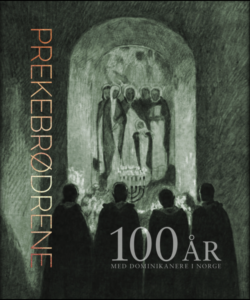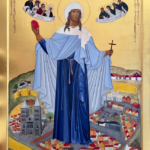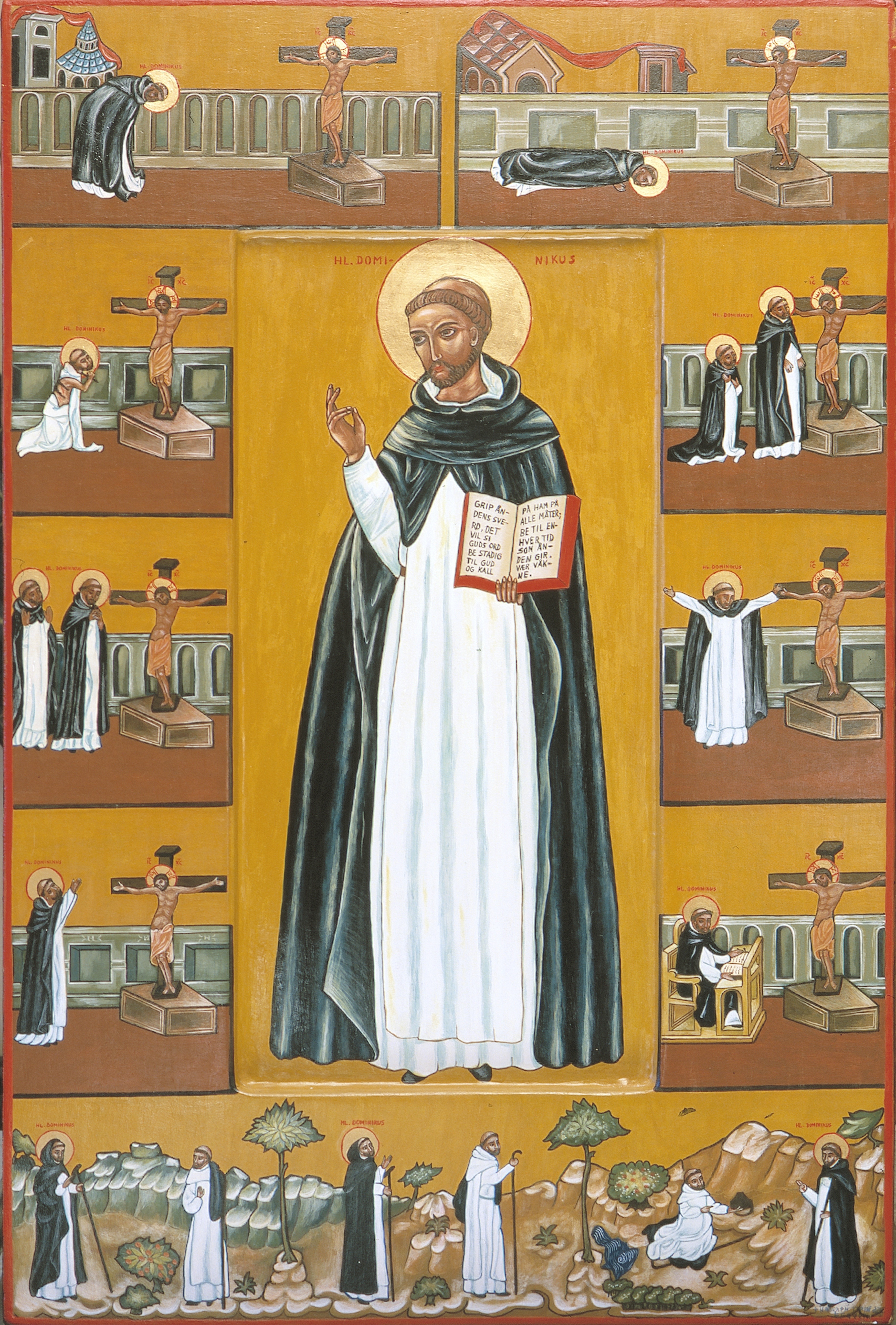OP på økumenisk møte for ordensfolk i Sverige
 Fra 31. august til 5. september 2023 fant den 22. CIR (International and Interconfessional Congress of Religious) sted i Sverige. Kongressen hadde et sterkt dominikansk innslag, ettersom fr. Pierre-André Mauduit OP i Lund er president for hele organisasjnen og sr. Thérèse Lacoste OP fra nonneklosteret i Langeac (tihørende samme føderasjon som Lunden kloster) sitter i styret. I tillegg deltok sr. Ingeborg-Marie OP fra Lunden i år som «førstereis-nonne». Les videre
Fra 31. august til 5. september 2023 fant den 22. CIR (International and Interconfessional Congress of Religious) sted i Sverige. Kongressen hadde et sterkt dominikansk innslag, ettersom fr. Pierre-André Mauduit OP i Lund er president for hele organisasjnen og sr. Thérèse Lacoste OP fra nonneklosteret i Langeac (tihørende samme føderasjon som Lunden kloster) sitter i styret. I tillegg deltok sr. Ingeborg-Marie OP fra Lunden i år som «førstereis-nonne». Les videre
Historisk hendelse i Finland
Dominikanerne i Lund feirer 800 år siden klostergrunnleggelsen
Vi gratulerer brødrene i Lund med det store jubileet!
Se fine bilder fra feiringen i en film fra Vatican News.
Les gjerne om jubileumsprogrammet på brødrenes nettside – Dominikanbröderna i Lund og se en omtale av jubileet i Signum; Dominikanskt jubileum i Lund.
Mulig å delta digitalt på symposium i Bergen 1.-2. desember 2022: Att tänka med Thomas av Aquino
Du kan få adgang til å delta digitalt på symposiet ved å sende en mail til Clemens Cavallin, Clemens.Cavallin@nla.no. Programmet kan du lese om her:
Att tänka med Thomas av Aquino
Å tenke med Thomas Aquinas
Symposium 1-2 december 2022
Arrangeras av det skandinaviska thomistiska seminariet, tidskriften Theofilos och forskargruppen för katolska studier vid NLA høgskolen
Plats: NLA høgskolen, campus i Sandviken, Amalie Skrams vei 3, Bergen, Norge,
Auditorium 2
Kontakt:
Angående programmet: Clemens Cavallin, Clemens.Cavallin@nla.no
Forskergruppen for katolske studier, NLA høgskolen, Peder Solberg: peder.solberg@nla.no
Program:
Vad är Gud? En online föredragsserie om Thomas av Aquinos filosofi och teologi
Det är gratis att delta, registrera dig bara för att få en länk från Zoom. Den kommer också att direktsändas på Youtube och Facebook.
Föredraget den 14. december hålls av Mats Wahlberg, docent i systematisk teologi vid Umeå universitet. Temat för föreläsningen är Thomas av Aquinos gudsbevis. Man kan följa föreläsningen via denna länk: https://angelicum.it/event/existerar-gud/
Föredraget finns också på Youtube, se https://www.youtube.com/watch?v=dFleg45H3oc
I kursusinformationen läser vi: Les videre
Charity, Humility and Voluntary Poverty: Saint Thérèse of Lisieux – a Dominican in Disguise?
“What indeed has Athens to do with Jerusalem?”[1] Tertullian’s rhetorical question concerning the relationship between philosophy and the Gospel could perhaps be transposed to the relationship between St. Thérèse of Lisieux and the Dominican tradition. Little Thérèse’s overflowing affectivity, her devotion to the Child Jesus and her frequent mention of flowers and birds may perhaps appeal to a Franciscan heart but, as Timothy Radcliffe O.P. says, the Dominicans tend to take a more “robust approach”, hesitating to use “sugary and sentimental” language,[2] and the only famous story involving St. Dominic and a bird, is the one where the devil disguised as a bird distracts Dominican nuns from listening to Dominic’s preaching. Dominic resolutely captures and plucks the bird, and that is the end of it.[3]
“How distressed I should be to have read all those books; I would just have got a splitting headache and lost precious time, which I have simply spent in loving God”[4] sighs Thérèse, while the love of books found its way into the Dominican tradition at an early stage. A 14th century Dominican goes as far as claiming: “Since our own Constitutions state that the Order of Preachers was founded for the study of Sacred Scripture and the salvation of our neighbour … we ought to know that we are bound to love books!”[5]
In spite of these striking and significant differences, if we take a closer look, perhaps there is more to this relationship than meets the eye – and this not only due to the fact that Thérèse clearly loved Scripture, read and meditated it assiduously, and even said she would have liked to learn Hebrew “to be able to read the word of God in the language in which he was pleased to express himself”[6] or that she quotes the Dominican Blessed Henry Suso as her source when speaking about the spiritual danger inherent in the use of instruments of penance.[7] Are there crumbs falling from the child Thérèse’s table that the “Dogs of the Lord” might be nourished by and even savour? [8] And could those who find little Thérèse’s dishes hard to digest perhaps through the Dominican tradition receive the Gospel substance of her teaching under different species? Les videre
7. juni 2021: 70 år på Lunden
Oslo-dominikanernes 100 år i Neuberggaten feires med bok
 Boken “Prekebrødrene”, en tekstsamling av og om dominikanerbrødrene i Oslo, ble lansert søndag den 30. mai 2021. Lanseringen skjedde i klosterhagen i strålende sol, like ved stedet der det første kapellet var, der brødrene for første gang kunne invitere til høymesse pinsedag 1921.
Boken “Prekebrødrene”, en tekstsamling av og om dominikanerbrødrene i Oslo, ble lansert søndag den 30. mai 2021. Lanseringen skjedde i klosterhagen i strålende sol, like ved stedet der det første kapellet var, der brødrene for første gang kunne invitere til høymesse pinsedag 1921.
På grunn av smittevernreglene kunne bare et begrenset antall gjester være til stede ved lanseringen av boken. Men alle som ville, kunne følge begivenheten direkte på internett. Opptaket er fremdeles tilgjengelig på www.katolsk.no, se Festskrift lansert: Blå himmel over brødrene. Her finner du også intervjuer, bilder og informasjon om boken og om brødrene.
Hovedfeiringen av 100-årsjubileet skjer i begynnelsen av august i forbindelse med St. Dominikus’ fest den 8. august.
Lær oss å be
I 2021 minnes vi at det er 800 år siden vår far Dominikus avsluttet sin jordiske karriere.
Lik sin Mester, etterlot han seg minimalt av skriftlig materiale. Hans arv til oss var først og fremst den åndelige familie han hadde samlet: vår Orden, med dens strukturer og tradisjoner, brødre og søstre, samt hans eget eksempel: beretningene om hvordan Dominikus hadde levd og lært, hvordan han fulgte Kristus.
Blant disse overleveringene finner vi beskrivelsene av hvordan han ba, skrevet ned, illustrert og kommentert av brødre og søstre gjennom historien, til instruksjon og inspirasjon.
Jubileumsåret kan være en anledning til å oppdage eller gjenoppdage denne kilden, både for dominikanere og andre. Tekst, bilder og kommentarer legges ut med jevne mellomrom gjennom årte på hjemmesiden til søstrene på Lunden: https://lunden.katolsk.no/tag/st-dominikus-ni-mater-a-be-pa/




